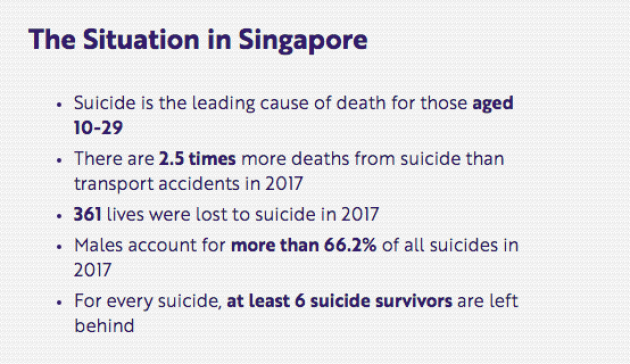While other MPs kicked off the Budget 2019 debate by discussing various aspects of the budget and industry sectors, Nominated MP Anthea Ong chose to take a different tack.
In her maiden Budget speech on Wednesday, Feb. 27, Ong, a social entrepreneur, acknowledged inequality, ageing population and climate change as long-term challenges facing Singapore, but something that's so far not been discussed is the issue of mental health and well-being.
"Mental wellbeing must be an ongoing national and whole-of-government priority with the recognition that our quality of life is defined not only by markers of economic growth and our material wellbeing but also our subjective wellbeing. We must constantly question if our national policies and spending empower, beyond just enabling, our people to be ready for challenges ahead and confident of our future."
Personal experiences with mental health issues
In her speech, Ong shared her own personal experiences with depression.
She mentioned her own "close shave" with depression 12 years ago, despite having achieved professional and economic success.
Ong also talked about the people she had known in her life who had their own experience with mental health issues.
These include a colleague who almost committed suicide even though he was being treated for depression, a neighbour who started sleeping at a void deck after his wife's death, a taxi driver whose grandfather committed suicide while the rest of his family was eating breakfast just inside where he jumped, and her own teenage nephew, who was diagnosed with depression and anxiety disorder.
People of all ages are affected
Ong pointed out that her nephew was not alone, with more young Singaporeans seeking help with mental health issues:
- The number of Singaporeans between 16 and 30 who sought help from the Institute of Mental Health's (IMH) Community Health Assessment Team has risen by 190 per cent over the past three years.
- The number of children aged five to nine calling the SOS hotline gone up more than fivefold in less than three years.
- Suicide is the leading cause of death in Singapore for those aged 10 - 29.
She also said young Singaporeans are the group most at risk of suffering from mental disorders, according to the December 2018 Singapore Mental Health Study.
But Ong also cited more statistics to show that working adults and the elderly are also at risk if mental health issues are not addressed:
- 90 per cent of psychological conditions in working Singaporean adults are caused by workplace stress.
- 86.5 per cent of employed workers do not seek help with mental health difficulties.
- The mental well-being of working adults in Singapore is 13 per cent lower than the general population.
- 20 per cent of Singaporeans aged 75 and above show signs of depression.
- The number of Singaporeans aged 60 and above who committed suicide was the highest in 2017, since records began in 1991.
Ong added that vulnerable communities like elderly caregivers, migrant workers and single-parent heads of households were also at high risk of suffering from mental health issues.
1 in 9 S'poreans suffer from diabetes, but 1 in 7 have mental health conditions
And while the government has declared a war on diabetes, Ong pointed out that diabetes affects one in nine Singaporeans (in 2017), while mental health conditions affect one in seven Singaporeans.
This is an increase from one in eight Singaporeans, just eight years ago.
Ong acknowledged the importance of addressing the challenges that come with our ageing population in policy-making.
"Yet, there is clear and present danger that the invisible yet mounting challenge of mental health could be headed that way with the escalating prevalence. We must therefore make mental health a deafening priority now rather than languishing it in the shadows because mental health affects the lives of Singaporeans across all ages and segments."
 Screen shot from Samaritans of Singapore.
Screen shot from Samaritans of Singapore.
View mental health as a "basic need", reduce stigma in seeking help
Ong made some suggestions on how the government could proceed with tackling the issue.
The first is to normalise mental health, reduce stigma and view it as a basic need, and bring it out into the open.
This is important when 86.5 per cent of those employed don't seek help for mental health difficulties, and two-thirds don't seek help due to stigma and discrimination.
The second is to recognise that support for mental health should not be the sole purview of the Ministry of Health.
Instead, the impact any policy may have on mental health should be considered across the whole of government.
Ong also suggested that optional mental health programmes in schools should be made mandatory, to provide better support and help normalise the issue.
She also proposed that the Workplace Health and Safety Act could be updated to also cover mental as well as physical well-being.
Long-term focus needed
Ong said she doubted that "one-off and discriminate bonus payouts" would be enough to allow citizens to thrive "mentally and confidently".
"The way we look at mental health reminds me of climate change, Mr. Speaker. It’s invisible, and so it gets parked mindlessly and incorrectly in the ‘important but not urgent’ quadrant of our awareness. Yet like climate change, it’s our future — our young ones — that we are jeopardising most if we continue with a transactional approach in addressing the challenge."
Instead, she suggested that a national coordinating body be established to improve mental well-being. Said Ong:
"It’s time for the government to recognise, acknowledge and understand the complexity of mental health and to create opportunities and solutions to improve the lives of our people, especially our children and youth.
It’s time to redefine our values as a nation as cherish every individual’s subjective well-being, dreams and aspirations beyond just their material and economic achievements. It can be done, it must be done because mental health is what makes us human."
Related stories:
Top image from Parliament and Samaritans of Singapore.
If you like what you read, follow us on Facebook, Instagram, Twitter and Telegram to get the latest updates.
